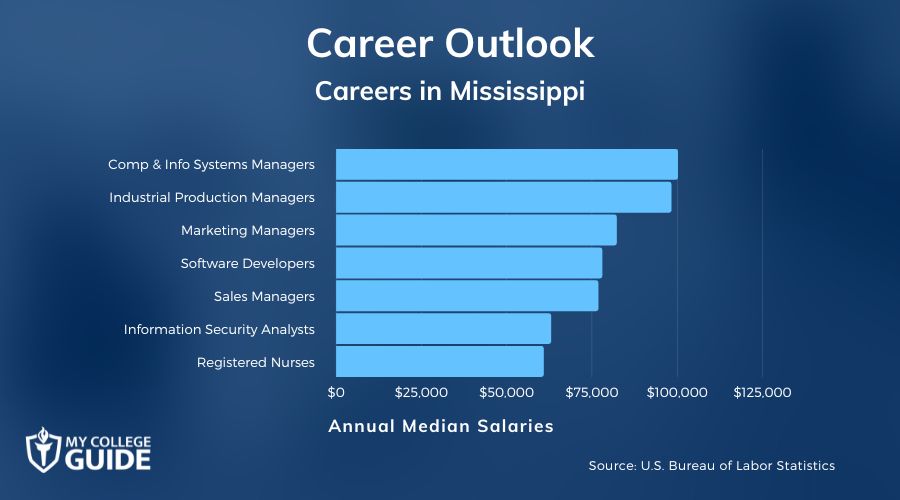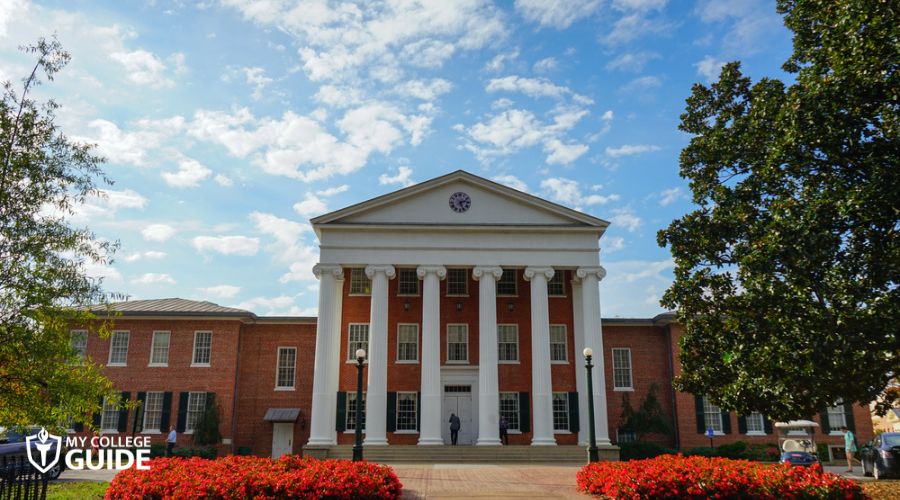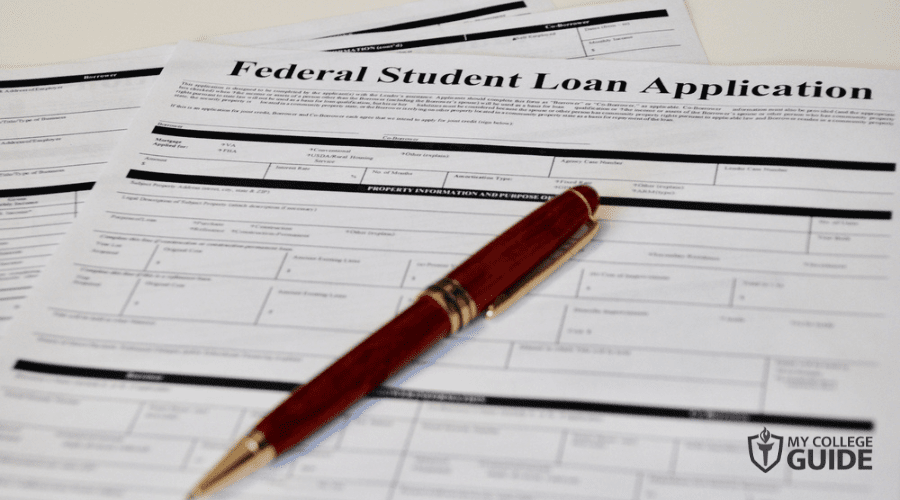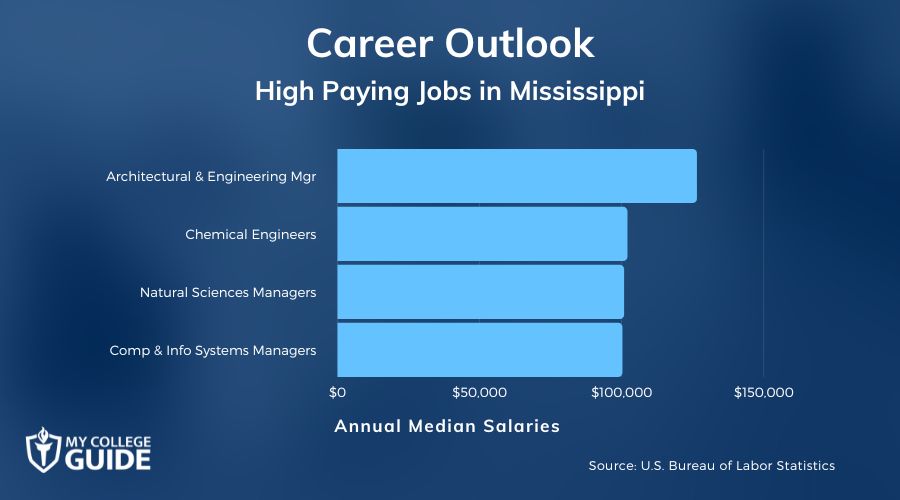The various online colleges in Mississippi offerings prove that the “Deep South” state is deeply invested in education.

Mississippi has a wide array of colleges and universities to choose from, with degree programs offered in both traditional and online formats.
Editorial Listing ShortCode:
Students are supported by a number of state-sponsored financial aid programs, proving Mississippi is committed to making higher education attainable for all its residents.
Online Colleges in Mississippi

Online learning can be a convenient and flexible way to earn a degree while still maintaining a career, family, or other obligations.
Data from the National Center for Education Statistics (NCES) shows that approximately 22.8% of undergraduate students in Mississippi were enrolled exclusively in online college courses. Another 33.4% were participating in a hybrid of online and on-campus courses.
Nearly all of Mississippi’s institutions offer some online learning opportunities. Colleges within the state offer an impressive array of online bachelor’s degree programs including Business Administration, Communication, Paralegal Studies, Homeland Security, and Loss Prevention, as well as several certificates and graduate degree programs.
Editorial Listing ShortCode:
Private schools throughout the state also offer a variety of online degree options as well. Community Colleges across the state are also on board when it comes to virtual education, too. Multiple schools have banded together to form the Mississippi Virtual Community College (MSVCC).
Through MSVCC, a student can enroll at his or her local college and receive advisement, counseling, financial aid, learning resources, and earn credit through that school, but can complete courses available at other participating schools online. MSVCC supports approximately 60,000 online enrollments each year.
Common Online Degrees in Mississippi

There are many types of degrees offered by Mississippi online colleges, such as:
- Nursing: A bachelor of science in nursing prepares students to sit for the NCLEX-RN licensure exam by offering coursework on patient care, health promotion and assessment, and health across the lifespan.
- Elementary Education: Students interested in becoming an elementary school teachers can pursue a bachelor’s in elementary education and take coursework in classroom discipline, foundations of teaching, teaching pedagogy, and instructional technology.
- Computer Information Systems: This is an information technology degree that introduces students to business information systems, web technologies, and cyber risk management.
- Marketing: A marketing degree involves the study of marketing principles, strategic marketing, market research, and business and marketing functions in different industries.
- Industrial Technology: This degree program is designed to prepare students for a career as an industrial technologist or similar role by including topics on manufacturing principles, management concepts, and various types of technology.
These are just a few examples of online degrees offered, but there are many more available that may support your interests and career goals.
Overview of Higher Education in Mississippi

Mississippi has 36 degree-granting institutions to choose from, according to the NCES. Of the 34, 23 are public schools, 9 are non-profit private schools, and 2 are for-profit private schools. The NCES reports that the average cost for residents to attend one of the state’s 4-year colleges is $8,642, while non-residents will pay closer to $19,080. Both are well below the national average.
Editorial Listing ShortCode:
Mississippi is a member of the Southern Regional Education Board (SREB), a 16-state collaboration focused on sharing resources and initiatives to improve higher education. Through this organization, residents are able to pursue degrees in participating states while paying in-state tuition rates.
Employment Outlook for College Graduates in Mississippi

There are about 1.1 million people employed in the state of Mississippi. Top occupational groups with the most employment include office and administrative support, transportation and material moving, sales, and production.
Some of the top areas of entry-level employment that may be attainable with an associate’s or bachelor’s degree include registered nurses, elementary and secondary teachers, and bookkeeping, accounting, and auditing clerks. According to the Bureau of Labor Statistics, all occupations in Mississippi combined had an estimated annual median salary of $35,069.
Industries with the highest positive 12-month percentage change for job growth include mining and logging, education and health services, and information services.
Careers & Salaries in Mississippi

Some of the top industries in Mississippi include advanced manufacturing, agriculture, distribution and logistics, and forestry and energy.
According to the Bureau of Labor Statistics, these are the annual median salaries of careers in Mississippi:
| Careers | Annual Median Salaries |
| Computer and Information Systems Managers | $100,110 |
| Industrial Production Managers | $98,220 |
| Marketing Managers | $82,200 |
| Software Developers | $77,960 |
| Sales Managers | $76,810 |
| Information Security Analysts | $62,960 |
| Registered Nurses | $60,800 |
| Elementary School Teachers | $45,760 |
| Agricultural Technicians | $38,400 |
| Education and Childcare Administrators | $28,890 |
Job availability and salaries can be commensurate with geographic location, work experience, level of education, and industry.
The occupations listed may be attainable with an associate’s or bachelor’s degree. Earning an associate’s degree can make you a more competitive job candidate for positions that require a high school education or some postsecondary education.
Editorial Listing ShortCode:
A bachelor’s degree can be beneficial if you wish to pursue a career that requires a bachelors for entry or if you want to start your educational journey toward an advanced degree.
Should I Study in Mississippi?

Studying at a Mississippi college might come with more benefits, depending on what you’re looking for in a degree program.
These are some things you can consider to help you decide if enrolling in an online Mississippi college program is right for you:
- Does your desired career require a degree?
- Is your degree of choice offered by online colleges in MS?
- Cost of tuition
One of the first things many students looking into college consider is whether they actually need a degree to enter their desired career or not. Some occupations may be attainable with a high school education, but a degree can also make you more marketable to employers.
If you want to attend a Mississippi college but are unable to attend an in-person program, an online degree might be a better option. There are numerous online degrees offered, but options may be more limited compared to on-campus or hybrid programs.
The cost of tuition is a big factor for many students. If you’re an out-of-state student, tuition rates may be higher unless you’re eligible for a state reciprocity program. Mississippi online degrees may be cheaper than on-campus degrees for in-state and out-of-state students.
Online Universities in Mississippi Admissions Requirements

Colleges and universities have admissions requirements that students must meet to be considered for admission, such as:
- High school diploma or GED
- Official transcripts
- SAT or ACT scores (only some schools require them)
- Letters of recommendation
These are some general requirements, but the materials requested can vary depending on the school and program you may choose. Many schools are ruling out SAT or ACT scores for admissions, but some institutions may request them to determine general education placement or admissions eligibility.
MS Colleges Online Accreditation

While you’re exploring prospective schools, an important thing to keep in mind is accreditation. The accreditation status of a school can potentially impact financial aid eligibility and other opportunities, such as graduate admissions and employment. Employers and graduate admissions offices may consider the accreditation status when reviewing applications.
Editorial Listing ShortCode:
Accreditation can also assure you that an institution meets or exceeds national educational quality standards. You can find a list of regional accrediting organizations and accredited postsecondary institutions on the Council for Higher Education Accreditation (CHEA) website. The CHEA also provides resources that can help you determine the quality of an institution.
Financial Aid and Scholarships

In Mississippi, in order to access federal, state, and private financial aid, you will need to fill out the Free Application for Federal Student Aid (FAFSA). This information you provide is used to determine how much and what kinds of financial aid are offered to you when attending MS online colleges.
Other types of financial aid include grants and scholarships, which do not have to be repaid. The state of Mississippi provides millions of dollars in aid each year to help residents pursue higher education. The following programs are offered to support residents:
- Mississippi Tuition Assistance Grant (MTAG): Must have a GPA of 2.5 or higher and score at least a 15 on the ACT; Must not be eligible for full Pell Grant; $500 per year for freshmen and sophomores, $1000 per year for juniors and seniors
- Mississippi Eminent Scholars Grant (MESG): Must have a GPA of 3.5 or higher and score at least 29 on the ACT / 1350 on the SAT; Up to $2500 per year
- Higher Education Legislative Plan for Needy Students (HELP): Must have a GPA of 2.5 or higher and score at least a 20 on the ACT; Must complete HELP Core Curriculum; Must meet income limitations; Covers full tuition and fees
- Mississippi Law Enforcement Officers & Firemen Scholarship: For dependent children and spouses of a law enforcement officer or fire-fighter who died or become permanently disabled while on duty; Covers full tuition and fees
- Nissan Scholarship: Must have a GPA of 2.5 or higher and score at least a 20 on the ACT / 940 on the SAT; Must demonstrate leadership abilities through participation in extracurricular activities; Essay required; Covers full tuition and fees
The state also offers forgivable loans for teachers and nurses and some related fields. To receive this type of loan, a student must sign a contract agreeing to work for a certain period of time in a certain area. Once they complete the obligation, the student loans will be forgiven.
There are also privately funded scholarships available to Mississippians. Here are a few:
- Kids’ Chance of Mississippi Scholarship: Varies
- Korean American Scholarship Foundation – Southwestern Regional Chapter: $500-5000
- Society Plastic Engineers Scholarship: Varies
- Southern Automotive Women’s Forum Scholarship: Varies depending on number of applicant (generally $1000-5000)
- Tupelo Elvis Fan Club Scholarship: $5000 (1), $3000 (1), $2000 (1)
Finally, be sure to check with the financial aid office at the college(s) you’re considering. Most schools offer aid programs and can help you determine what you may qualify for and how to apply.
Mississippi Online Education Resources

College education online resources may provide you with a wide range of information on college and career planning.
- Get2College: This website offers resources on financial aid, ACT preparation, and college and career planning.
- MS.gov: The official website of Mississippi provides education information for college students, such as Mississippi colleges and universities, financial aid, and college savings.
- My Way Mississippi: This resource center may help you navigate state and financial aid opportunities, college prep, career exploration, and colleges and degrees offered in Mississippi.
Accessing college resources may help you get a better understanding of the different college and career opportunities available.
How Much Does It Cost to Go to an Online College in Mississippi?

The total cost of college includes several expenses, such as tuition and required fees. Room and board and travel expenses typically don’t apply for online programs.
According to the National Center for Education Statistics (NCES), the total cost of attendance for in-state, out-of-state, and private Mississippi colleges is lower than the national average. Cost of attendance can vary over time and differ between schools and specific majors.
Editorial Listing ShortCode:
According to NCES data, the average cost of attendance for in-state Mississippi students is $19,221. The average cost of tuition for out-of-state students is $20,160.
Tuition Breaks for Out-of-State Students

Many colleges and universities have higher out-of-state tuition rates. State reciprocity programs are designed to give out-of-state students a tuition break.
Mississippi is a participating state of the Academic Common Market (ACM) program offered by the Southern Regional Education Board. The ACM is a multi-state reciprocity program that helps eligible students reduce their out-of-state tuition costs to reflect in-state tuition rates.
The ACM includes several other southern states. The program is designed for students who want to earn a degree from a Mississippi institution that may not be offered in one’s home state. You may be able to reduce your cost of out-of-state tuition if you live in a state that participates in the ACM and you’ve been accepted into a program that’s ACM-approved.
Although the cost of attendance might be cheaper for online programs, some institutions may require additional fees to provide distance learning instruction and resources.
What Jobs Are in High Demand in Mississippi?

According to the Mississippi Department of Employment Security, jobs that typically require some postsecondary education or a bachelor’s degree for entry with the most projected annual job openings include:
- Registered Nurse
- Bookkeeping, Accounting, and Auditing Clerks
- Elementary School Teacher
- Teaching Assistant
High demand jobs may be more available and easier to access than occupations in low demand. Occupational groups projected to have the highest employment growth rates and the most job openings include healthcare support and food preparation and serving.
What Are the High Paying Jobs in Mississippi?

The highest paying jobs in Mississippi are in the healthcare field and typically require at least a master’s degree for entry. According to the BLS, the highest paying careers in the state that typically require a bachelor’s degree for entry include:
- Architectural and Engineering Managers: $126,298
- Chemical Engineers: $101,878
- Natural Sciences Managers: $100,693
- Computer and Information Systems Managers: $100,110
Although a bachelor’s degree is usually the minimum requirement for entry into these careers, considerable work experience or specialized credentials may be valued by employers to advance into management-level positions.
List of Online Colleges in Mississippi
Methodology: The following school list is in alphabetical order. To be included, a college or university must be regionally accredited and offer degree programs online or in a hybrid format.

Belhaven University offers a variety of flexible online degree programs. Options for a bachelor’s degree include majors such as accounting, hospitality management, RN-to-BSN, applied psychology, and business administration.
Options for a master’s degree include majors such as health administration, teaching, information technology management, and more. Courses are commonly 7 weeks long each and are typically taught from a Christian perspective.
Belhaven University is accredited by the Southern Association of Colleges and Schools Commission on Colleges.

Delta State University offers fully online graduate degree programs. Common majors include business administration, geospatial information technologies, liberal studies, criminology, counseling, and English. Delta State University was selected as a national training location for the Teach for America program.
Delta State University is accredited by the Southern Association of Colleges and Schools Commission on Colleges.

Online degree programs at Mississippi College are designed to provide a structure and format that meets the needs of adult learners. Possible majors for online bachelor’s degree programs include business administration, homeland security, loss prevention, nursing (RN to BSN), and paralegal studies. The aim of the programs is to provide the flexibility to maintain work and family commitments.
Mississippi College is accredited by the Southern Association of Colleges and Schools Commission on Colleges.

Mississippi State University’s online degree programs aim to provide the same academic rigor as those on campus but with greater flexibility so as to achieve a balance between education and personal responsibilities. Options for a bachelor’s degree program include electrical engineering, business administration, art history, industrial engineering, interdisciplinary studies, psychology, and more.
Mississippi State University is accredited by the Southern Association of Colleges and Schools Commission on Colleges.

The University of Southern Mississippi offers numerous degree programs fully online at both the undergraduate and graduate levels.
Bachelor’s degree program options include human resources management, industrial engineering technology, and construction management. Master’s degree options include child and family sciences, educational administration and supervision, and library and information science.
The University of Southern Mississippi is accredited by the Southern Association of Colleges and Schools Commission on Colleges.

William Carey University offers fully online bachelor’s and master’s degree programs. Possible majors for bachelor’s degree programs include health administration and education, supervisory management, physical education, nursing (RN-to-BSN), and health information management.
William Carey University is accredited by the Southern Association of Colleges and Schools Commission on Colleges.
Getting Your Online Degree in Mississippi

If you’ve been thinking about attending a college or university in Mississippi, you’re in luck! The state’s top schools offer online learning opportunities at all degree levels, and there are numerous financial aid programs to help make your dream a reality.
To kickstart your education journey, you can start researching accredited Mississippi online schools that offer your chosen degree program.
You can also view our Online Colleges in Minnesota and Online Colleges in Missouri guides for more options.
